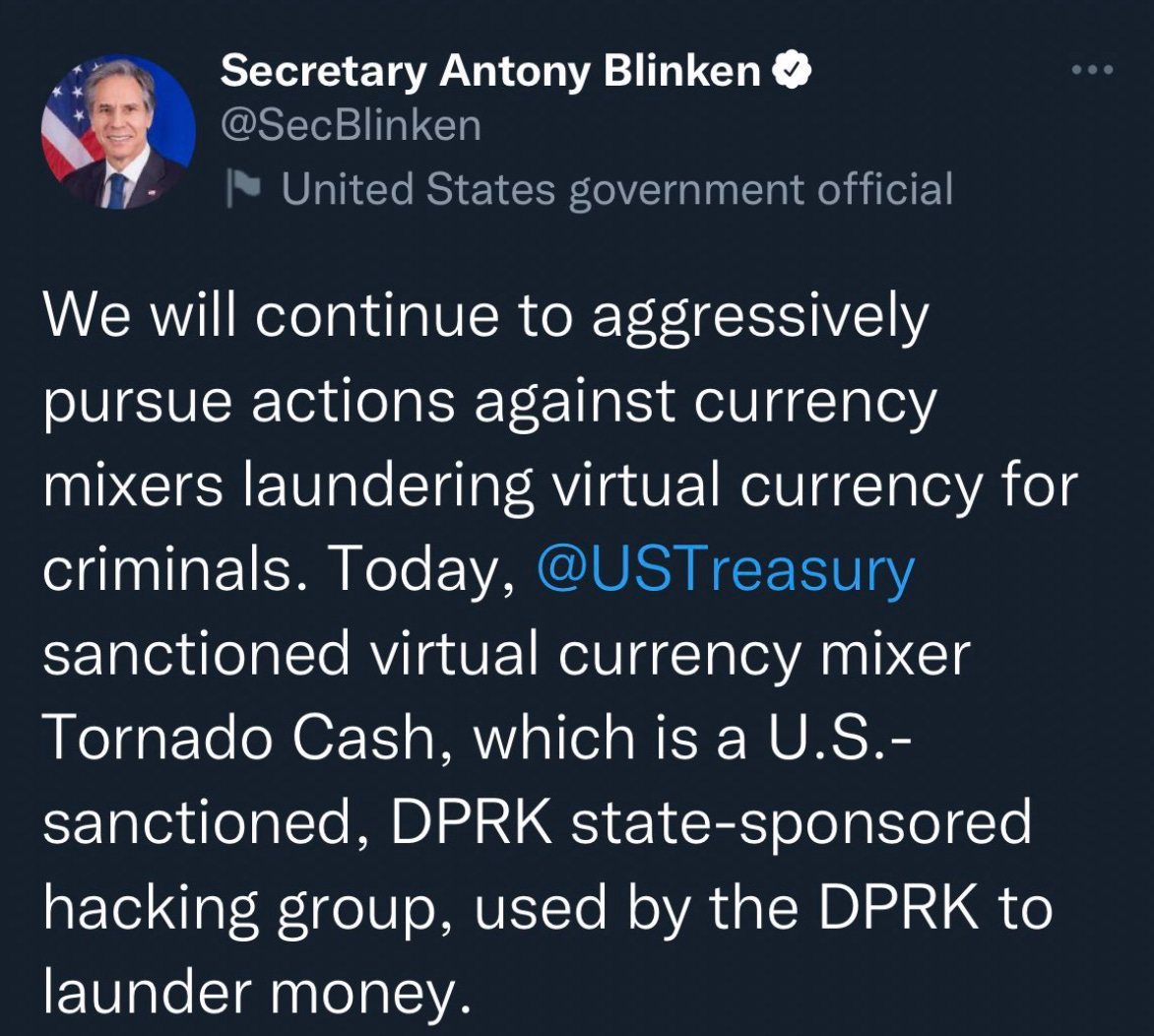Back from my friend’s bachelor party and I am alive, woohoo!
I shared with my WriteWeb3 crew I was planning to take a break from writing today and catch up on e-mails, and other to-do’s from the long weekend.
Well…I changed my mind pretty quick.
Also, short and sweet means a full-on TPan post…it is what it is.
As the title suggests
There’s a big development around a tool called Tornado Cash — it has been sanctioned by the US government and is creating some immediate ripple effects in the space.
Please note that I am not an expert on this topic and it’s still developing. However, I think it’s big enough to share with y’all.
Earlier this morning, US Secretary of State Athony Blinken tweeted the following:
Why is this tweet a screenshot? Well, it’s factually incorrect. Tornado Cash is not a North Korean hacking group.


The original tweet was deleted and edited that a North Korean hacking group has used Tornado Cash, hence the sanction.

Additionally, the US Department of Treasury has shared a list of sanctioned wallets along with Tornado Cash.
OFAC = Office of Foreign Assets Control
SDN = Special Designated Nationals and Blocked Persons List
So what does all this have to do with Tornado Cash?
@BowTiedIguana breaks it down for my pea-sized brain

And here’s the summary:
OFAC administers and enforces sanctions against high profile individuals (eg: terrorists) and countries that are hostile to American interests. The list of those individuals/countries is SDN.
It is illegal for any US person (including companies) to engage and in any trade or economic transactions with the SDN list. Big fines and jail time for any violations.
Addresses holding non-ETH assets (eg: USDC and Tether) can have their assets frozen by the issuers of those assets as they are created by companies. For example with USDC, Circle (issues USDC) has moved quickly to freeze the addresses listed on SDN.
This part of the tweet thread caught my eye
I’m assuming this is for anyone that interacts with Tornado Cash after the announcement. That said, I will admit that I visited Tornado Cash once last year just to see what it looked like and how it worked. I had no reason to use and did not use it (too poor to 😂).
So why the fuss?
To the average person (including myself for the most part), this is not a big deal. And I believe that a percentage (who knows how much) of Tornado Cash users are doing it for criminal reasons. Also, for those that use Tornado Cash for criminal reasons, it doesn’t mean they won’t get caught. It’s harder though.
However, this can also be interpreted as a war on privacy.



In my naivety, I was curious what some other smarter people than me thought, and this response stuck out to me. Also, this conversation is what made me decide to write about this topic today instead of taking a break 😂
These examples are a little extreme, but the point is a good one.
Because the Secretary of State says that there is one bad actor that has used Tornado Cash, does that justify banning it in the US?
How many murders from hammers in the US before we ban those — 10, 100, 1000?
There were 393 murders in the US in 2020 from blunt objects including hammers 🤔
Another way of thinking about this is from my previous life in the mobile growth world. Apple got rid of an advertiser identifier last year in the name of protecting its users’ privacy. However, they still have the data and use it for their own purposes. Coincidentally, Apple’s Ads business has grown a lot since they got rid of that identifier. Just a coincidence 😉
Are we ok with that? The average person probably is (they also don’t think about this lol) since most Apple users love Apple…but there are parallel themes going on. A good overview about what’s going on there:


Nothing weird, move along. WE LOVE APPLE.
So what else is notable with this ongoing development?
Will there be a formal framework or criteria for the government to justify banning a particular Web3 protocol or product? If the government can ban a product because of one bad actor using it, will there be more?
Although it is much harder, government agencies have been monitoring mixers like Tornado Cash closely for a while
What will the future of blacklisting look like? We’re seeing this happen in real-time as mentioned above. There will be many edge cases and limitations, but it will happen. Note that the US can ban Tornado Cash and associated wallets, but cannot shut it down. It lives on the blockchain after all.
Is this a battle against criminal activity or something else? This is a trick question because it can be both. There is criminal activity through Tornado Cash, but there are also plenty of users that use the same protocol for privacy purposes. Yes, people in crypto who are not are big on privacy for principle’s sake.
A lot more moves will be made and the dust will not settle for some time. If anything, it’ll continue to get kicked up.
See you tomorrow folks. Back to 💯 soon.












